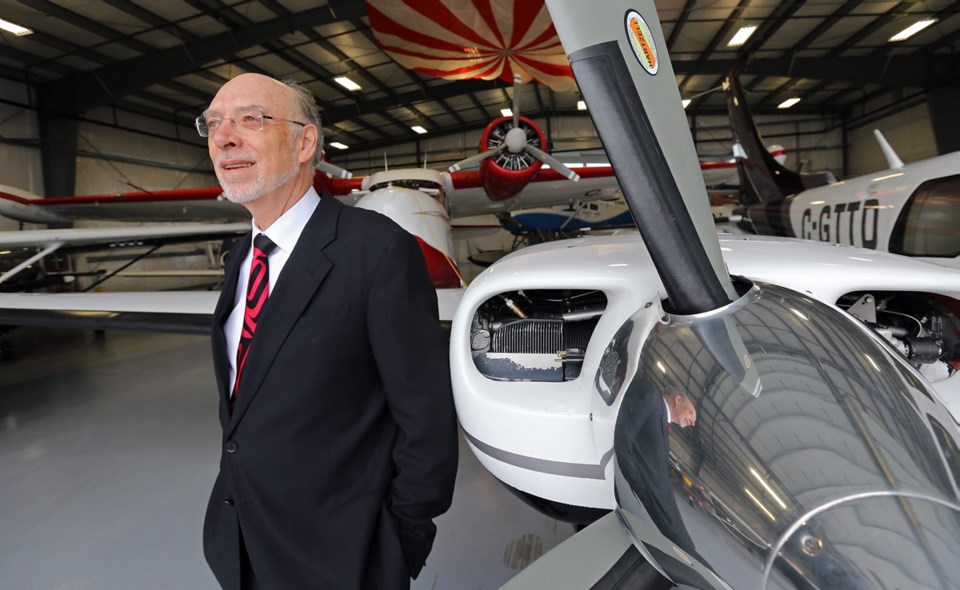If all goes to plan, Victoria-based Blue Fuel Energy could pull the trigger on construction of a $2.5 billion gasoline refinery in northern B.C. by the end of this year.
Blue Fuel chief executive Juergen Puetter said the company expects to have its engineering work done, plant designs complete and permitting in place by the end of this year in order to make a final investment decision on the plant near Chetwynd.
“We could start construction in 2016, but things have to go reasonably well for that to happen,” said Puetter, who estimates Blue Fuel will spend $50 million this year just to get to the point they need to raise $2.5 billion for capital construction costs.
Blue Fuel’s refinery project is the fourth to be proposed for northern B.C. In 2012, Victoria newspaper magnate David Black launched a campaign to establish Kitimat Clean, a $22 billion refinery on B.C.’s west coast, which was followed by the $10 billion coastal refinery proposed by Pacific Future Energy. The fourth is Eagle Spirit Energy’s proposal to connect a pipeline from Alberta to an upgrader either in northeastern B.C. or northern Alberta.
Puetter, who is chief executive of Aeolis Wind Power and Canadian Methanol Corporation, believes the investment capital is out there. “I don’t believe that’s a problem,” he said in an interview. “And I think we can do it locally.” By locally he means North America, though he said they have had interest from overseas.
The money would go to building a processing facility that would convert natural gas to gasoline and produce nearly one billion litres of gasoline annually, the equivalent of 20 per cent of all gasoline consumed in B.C. in a year.
Because the process consumes carbon and the facility is fueled by electricity, Puetter said it has a small carbon footprint and will create an ideal drop-in fuel for places such as B.C., Oregon and California that have a low-carbon fuel standard.
Using technology licensed from Exxon Mobil, the process includes first making methanol and dehydrating it into a carbon-reduced gasoline.
“We are doing something that is good for the planet, showing you can marry renewable resources with fossil fuels,” Puetter said, adding he can see a time when gasoline could be made from only renewable resources.
The 1,055-acre site for the plant near Chetwynd, close to B.C.’s natural gas fields, would allow the company to use existing rail infrastructure to ship the final product without the need for pipelines.
Blue Fuel communications director Alan Bryce said they don’t have any firm plans on a natural gas source. “We are currently in discussion with a couple of potential suppliers,” he said. “That is a key element of the equation, but it’s not going to be very difficult to solve. People want to get rid of their gas up there.”
Puetter’s Canadian Methanol Corporation also has plans to establish a $1.8 billion methanol plant at the same site to produce methanol to be used as a raw material by a hungry manufacturing market.
Construction of the two sites will require as many as 1,500 workers and the two facilities combined will employ 275 to 300 people full time.
Puetter said if the Site C hydroelectric dam goes ahead and the Alberta oilfields return to capacity, the cost of labour and finding skilled workers could be a problem and could mean the need for temporary foreign workers. “My preference is to work locally, though,” he said.
The plants could also be a boon to local First Nations, which Puetter said have been very supportive.
“What I learned from the wind-power business is if you don’t have social licence, you’re not going anywhere,” he said. Puetter has talked about offering both land and waste heat —a byproduct of the production of gasoline — to First Nations for greenhouses to establish greenhouse produce businesses. “With free energy in the northeast that can be extraordinarily profitable,” he said.
The plant is in the permitting stage with the provincial government, and Blue Fuel is working with the B.C. Oil and Gas Commission, Agricultural Lands Commission, Canadian National Rail and the District of Chetwynd.
Chetwynd Mayor Merlin Nichols has thrown his support behind the project.
The company has a memorandum of understanding with the West Moberly First Nation, which allows “both parties to explore additional opportunities and commercial benefits arising from the prospective production of renewable hydrogen and gas-derived liquid fuels on West Moberly First Nation’s traditional territory.”
The project has also been given what the company terms “broad-based” support among other Treaty 8 First Nations in the region. Puetter said similar memorandums are close to being completed with the Saulteau First Nation and the McLeod Lake Indian Band.
The company also has two former senior Methanex Corp. executives on board: Michael Macdonald, Methanex’s former vice-president of global operations, and Ron Britton, former vice-president, who is Blue Fuel’s new chief technology officer.
— Files from Alaska Highway News and Business in Vancouver



